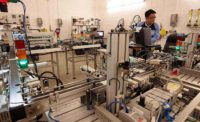Metropolitan State University Sets Its Sights on Innovation in Aerospace Manufacturing

Denver is called the Mile High City because of its location in the Rocky Mountains. But, a local college is poised to soar to even new heights because of aerospace manufacturing.
Metropolitan State University (MSU Denver) is a 50-year-old commuter school that boasts a diverse student population. Enrollment includes many minorities and first-generation college students. More than 27 percent of them are also majoring in science, technology, engineering or math (STEM) degree programs.
Metro State recently broke ground on a $60 million Aerospace and Engineering Sciences (AES) building that’s scheduled to open in the fall of 2017. The 142,000-square-foot, four-story facility will house a variety of state-of-the-art classrooms and labs. It will also be the home of Colorado’s only Institute for Advanced Manufacturing.
“Our goal is to develop the next generation of employees for Colorado’s burgeoning aerospace industry,” says Devi Kalla, Ph.D., an associate professor of mechanical engineering who is spearheading MSU Denver’s big push into additive manufacturing and carbon-fiber composites. “Local manufacturing is booming and those companies are looking for undergraduates who are knowledgeable in the latest advanced production technology.”
Colorado ranks second in the nation for private sector aerospace employment. The state is home to the Army Space Command, the Air Force Space Command and three space-related Air Force bases.
In addition, more than 400 consulting, engineering, manufacturing and supplier companies provide space-related products and services in Colorado. Manufacturers that have a major presence in the state include Ball Aerospace, Boeing, Harris Corp., Lockheed Martin, Northrop Grumman, Raytheon, Sierra Nevada Corp. and United Launch Alliance.
“These companies are leading some of the nation’s most significant space projects,” says Kalla. For instance, Sierra Nevada Corp. is changing the commercial space landscape with its Dream Chaser space transportation system. And, Lockheed Martin is developing the Orion Multi-Purpose Crew Vehicle to carry astronauts on deep space missions.
“Today, we are educating the next-generation of workforce-ready people who will build the spacecraft of tomorrow,” says Kalla. “The goal is to provide career pathways and equip students with fresh ideas, experiences and thoughts that they can apply on the job.”
The new AES facility will house interdisciplinary programs, such as electrical and mechanical engineering, industrial design, and computer science, in one building. “All these departments recently collaborated on a new advanced manufacturing science program,” says Kalla. “The flexible curriculum is based on direct input from industry.”
One of the keys of the new initiative is to build a strong partnership between the university and local aerospace manufacturers through hands-on education.
Lockheed Martin Space Systems, which is based in the Denver suburb of Littleton, was closely involved in the project. The company is a leading producer of satellites and space probes.
Lockheed Martin and MSU Denver recently teamed up on a cooperative education program that links classroom work with practical on-the-job experience. The co-op allows students to understand how engineering feats and theories actually become a reality.
Seven students are currently participating in the full-time program, which runs 40 hours a week. They’re paired with Lockheed Martin engineers and work on a wide variety of projects that support spacecraft assembly, test and launch operations.
Projects range from creating circuit designs and pushing the boundaries of 3D printing to testing electromechanical systems and writing reports.
One student recently worked on a study about the effects of additive manufacturing on titanium powder. He was trying to figure out how many times it can be used before losing its manufacturing properties.
So far, the co-op program has proven to be a win-win for both MSU Denver and Lockheed Martin. In fact, the company has already offered jobs to several participants.
Looking for a reprint of this article?
From high-res PDFs to custom plaques, order your copy today!




